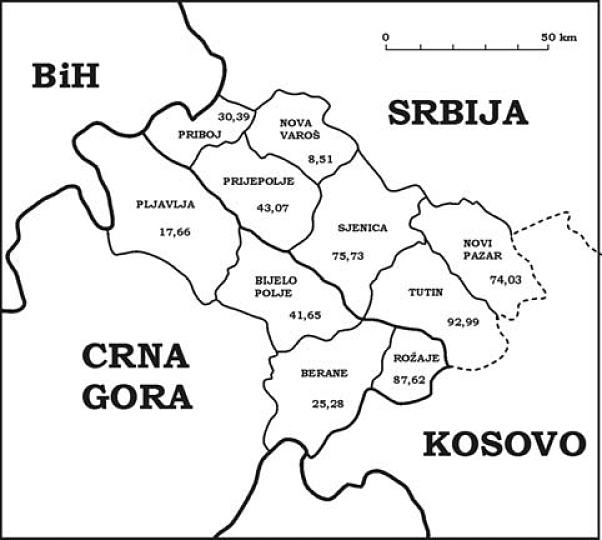The Bosniak National Assembly (BNA) – an informal parliament of indigenous Slavic Muslims in Serbia (an equivalent of the banned Mejlis of the Crimean Tatar people in Russia) – recently addressed neighboring countries in the region and international institutions with a proposal. The BNA proposes a solution to the problem of the Slavic Muslim (Bosniak) population living compactly in the border areas of Serbia and Montenegro in a way that does not violate the territorial integrity of these states, while at the same time promoting their European integration and serving the interests of all indigenous peoples in the region.
To this end, it is proposed that the regions of Novi Pazar, Sjenica, Tutin, Prijepolje, Nova Varos, Prijepolje, Plevlja, Belopolje, Berane, Andrijevica, Petnjica, Gusinje, Plav and Rožaje be granted the status of cross-border autonomous region. Bosniaks (Slavic Muslims) as well as Serbs, Montenegrins and Albanians are proposed to be officially recognized as constituent nations of this entity.
An interesting model of relations between this union and the outside world is also proposed. The region should be completely demilitarized under the control of the UN and the EU, whose troops and observers are called upon to become guarantors of its peaceful development and security. In addition, while official diplomatic relations will remain the prerogative of the states in which the region is located, it is proposed to give the region the right to engage in international relations regarding its internal development and cooperation with the outside world, especially in economic, scientific-technical, and cultural-educational matters.
It is obvious that the authorities of the states exercising sovereignty over these territories, in particular the Serbian President Aleksandar Vucic, have received this initiative without any enthusiasm. For their part, they are trying to ignore the “Bosniak problem” in the form of the compact settlement of Slavic Muslims on their territory and not to grant them any status, despite the fact that on almost half of the territory of Bosnia and Herzegovina there exists the mono-ethnic quasi-state formation of the Serbian Republic, created by the expulsion of hundreds of thousands of Bosniaks from their lands, the killing and rape of tens of thousands.
In contrast to such a scenario, the leaders of the Slavic Muslim community in Serbia propose a distinctly peaceful, demilitarized project under the auspices of the EU and the UN, based not on the hegemony of one nation, but on the equality of all the indigenous peoples of the region.
Unfortunately, there is no doubt that at this stage this initiative will be blocked by the Serbian and Montenegrin authorities. However, who knows – if this region manages to maintain peace and inter-ethnic balance until its accession to the EU, which both Serbia and Montenegro officially aspire to, the chances of implementing this project in the future may increase. After all, for a united Europe, such cross-border regions that overcome the isolation of national states and are interested in direct cooperation with the EU could become a factor that strengthens it and serves as a counterbalance to centrifugal and isolationist forces.

